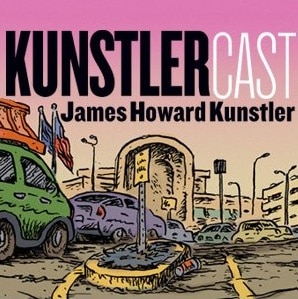
Vital stats:
Format: interview-conversations about “the tragic comedy of suburban sprawl”
Episode duration: 12m-1h20m
Frequency: weekly
Suburbia sucks, and ever-rising energy prices will soon destroy it. There you have the collected ideas, in caricature, of self-styled public intellectual James Howard Kunstler. For twenty years, he’s worked the city-planning, architecture, transit and urbanism/New Urbanism beats, territory where self-styled public intellectuals have been known to tread. Perhaps you’ve read the work of activist-journalist Jane Jacobs, to whom Kunstler often gets compared. When her 1961 book The Death and Life of Great American Cities grew famous and influential, the caricature of her ideas developed as follows: modernist urban planning (i.e., freeways and function separation) sucks, and if you let it happen, it will soon destroy you. These caricatures fail to convey the depth and nuance of Jacobs and Kunstler’s writing, as caricatures do. Alas, it seems that public intellectuals, especially self-styled ones, pay the price of caricaturization to find purchase in the zeitgeist.
If you wish to know more about precisely why Kunstler thinks suburbia sucks, allow me to suggest The KunstlerCast [iTunes] [RSS]. Taking a more unusual form than it might at first seem, the podcast presents a weekly conversation — more formal than a two-sided gab session, but looser than an interview — between Kunstler and co-host Duncan Crary. Aside from the occasional field trip to real streets and malls and such, each episode has Crary asking Kunstler for his thoughts on a certain subject, be it a city he’s recently visited like, say, Portland [MP3]; the work of another urbanist like, say, Jane Jacobs [MP3]; or even the very definition terms as basic as “urban” [MP3]. This may sound a tad technical or academic, but Kunstler, neither an academic nor a technician, seems constitutionally unsuited to letting conversations go dry. The man comes armed with judgments, often swift and harsh, about which cities he finds livable, which cities he finds hellish, and which cities he feels certain that energy crises will simply sweep away.
Kunstler premises many of his opinions, if not all of them, on his observation that the end of cheap energy — the “peak oil” crowd has taken to him, and he’s reciprocated — means the end of the energy-burning lifestyles dominant in America since the Second World War. Your detached, single-family, lawn-surrounded McMansion? Your hour-long freeway commute? Your 11-miles-per-gallon SUV? (Or your hybrid SUV, for that matter?) Prepare to kiss ’em goodbye, warns Kunstler. He worries that the country has fallen into hopeless denial about all this, but I feel no particular anxiety. If you, like me, grew up in a remote bedroom community dreaming of the ability to go to a building that wasn’t a house, you probably have the maracas out and ready for your dance on suburbia’s grave. Suburban energy inefficiency didn’t really bother me, but crushing suburban tedium sure did. Like the rest of a wave of twentysomethings Kunstler at times acknowledges (and whose presence I notice more and more in Los Angeles), I’ve made a flight, perhaps permanent, to density, diversity, and carlessness.
Listening to The KunstlerCast therefore gives us urbanites the buzz of having our suspicions spoken back to us, although Kunstler and Crary can get themselves into such acerbic feedback loops about suburbia that the show starts feeling like an echo chamber. As these guys beat up on the defenseless ’burbs, I sometimes want to cry out like the kid who watched Homer Simpson beat up the Krustyburglar: “Stop, stop, he’s already dead!” Much more interesting conversations happen when Crary gets Kunstler going on the hows, whys, and whats of suburban development: how did so much of the United States wind up so sterile, same-y, and inconvenient? Why did we let it happen? What physically makes these cities so undesirable? Kunstler does his best, in other words, when generating less heat and more light. I’ve thus found Kunstler’s descriptions and analyses of various cities, heighten them though he may, the most fascinating of all. (Though I admit to wincing when he exaggerates about places I know, as when he flatly speculates that it must cost Angelenos “a thousand dollars a week” just to park their cars [MP3].)
Unfortunately, people seem to like to pay Kunstler, as they like to pay most public intellectuals, to talk about the future. Forced into prognostication, a mug’s game if ever there was one, even the best tend to fall back onto an uneasy mixture of untestable provocation and squirrely hedging. Kunstler doesn’t wallow in that, but I get the sense that his proclamations on the coming age, some of which border (if only psychologically) on the apocalyptic, serve more as potential memes than tools of enlightenment. Murmurs of “James Howard Kunstler says peak oil will turn women back into homemakers” or “James Howard Kunstler says we’ll travel only on rivers by 2030” may not accurately represent either the future or Kunstler’s idea of the future, but I suppose they get him attention. And attention, I note with a sigh, seems to be the name of the public intellectual’s game.
[Podthinker Colin Marshall hosts and produces Notebook on Cities and Culture [iTunes]. Contact him at colinjmarshall at gmail or follow him on Twitter @colinmarshall.]